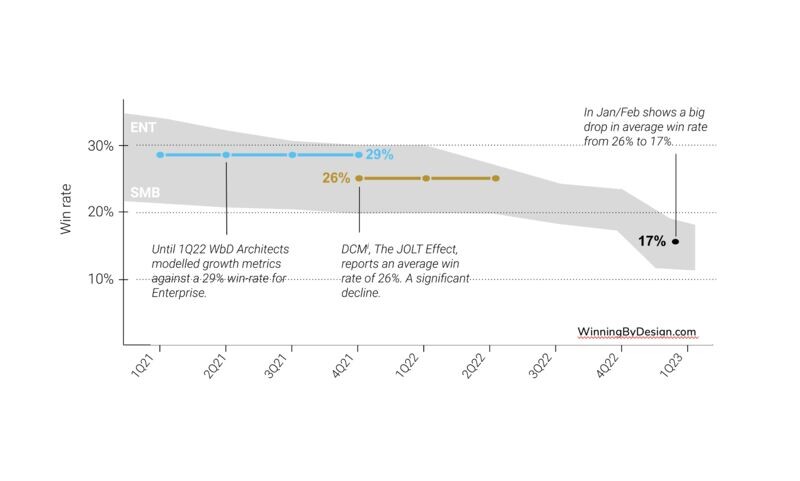There are a number of posts on LinkedIn, showing that win rates are at an all time low. This post by Jacco van der Kooij, talks about "win rates for Enterprise historically held steady at 29%, but as of Jan/Feb have dropped below 20%. Win rates for an small, medium business (SMB), historically at 21%, are now approaching 17%."

Jacco goes onto say
"In a healthy economy, it is not uncommon to see a temporary, even steep, decline in the win rate, often attributed to a significant increase in opportunities, for example, after a tradeshow or web event. In these cases, the product of the higher volume of opportunities and lower win rate tends to balance itself out.
However, sellers also report a steep decline in opportunities. And sellers talk of a more complex decision process, with a more prominent role of the CFO, resulting in a longer sales cycle."
Of course in any downturn, people will stop buying for buying sake and the CFO (Chief Finance Officer) will be asked to be involved. The CFO will clearly be looking for a return, that is a return on investment (ROI). Which in many cases will add a step or even two steps to the sales cycle, meaning the sale will take longer and probably take more resource to sell, impacting margins.
Jacco goes onto say.
"Due to the staggering decline, companies are already falling behind on the 2023 targets set mere few weeks ago, and the plan/budget for the year is already under pressure.
Unfortunately, we do not foresee any significant improvement in the SaaS market until late summer; in fact, we anticipate that the effects will worsen: We anticipate an ongoing increase in churn over the next 90 days, a 3 to 6-month delay from the layoffs, reported across the tech industry.
This means you will have to make do with what you got. Be prepared this debacle to dominate the forthcoming board meetings."
Totally agree, that as a leadership team we must have an answer. The problem is that is answer is not to pursue the current status quo.
Albert Einstein: The definition of insanity is doing the same thing over and over and expecting different results.
The two issues with cold calling solved!
1. Getting through to a person and
2. Getting that call to convert into a next step, such as a demo etc.
Research shows that at any one time 4% of the market is looking for your product or service, which means a 96% failure rate is acceptable. Problem is, cold calling is very inefficient and in many cases is only seeing a 1% or 2% return, that is a 99% and 98% failure rate.
Then as a business you have to convert the call to the next step. Which is difficult as you have annoyed the person with the cold call, which creates a fight or flight feeling in the person cold called.
You can invest in tools that will offer a 96% or even a 94% failure rate, which when compared with 99% failure rate it offers a change, but it not a step change.
So here at DLA Ignite we tried an experiment.
From the 1st January 2023, our partner Supero and the team there, Alex, Jensen and Jordan, implemented our social selling methodology and used it for cold outreach. And we measured every step.
So what of the results?
From cold outreach we got a 6.7% conversation rate, but the massive news is that from that first call we got 37.5% of organizations agreeing to a next step.
No spam and no automation!
The improvement from 4% to 6.7% is impressive; that's greater than 50% improvement.
But to go from 4% to almost 40% - That's EXPONENTIAL GROWTH
Just think about scaling that across your organisation
If Alex's team are achieving an average of 10 new conversations each week and a 37% conversion to a next step... if you have a team of 50 sales people that's 500 conversations per week (26,000 per year) with 185 follow-up calls per week. Forever!
Now is the time you need to use social selling for cold outreach!
Related: The Social Selling Benchmark: How Do You Measure Up?



